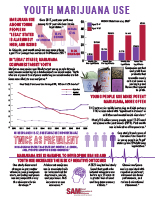Marijuana & Youth
With the legalization of marijuana in many states — including Rhode Island and Massachusetts — our children might be getting mixed messages on the risks, impact and dangers. Please talk to your child, they’re listening!
9 Parent Tips for Talking About Marijuana with Your Teen
1. Discuss How Laws are Different for Young People
Similar to alcohol laws, marijuana laws differ between adults and children. Recreational use laws apply to adults 21+ with medicinal use laws typically applying to adults 18+. If using, buying or possessing marijuana while underage, there can be serious consequences with a possible criminal record, fines or disciplinary action at school.
2. Set Clear Expectations
Have agreed-upon expectations and an understanding that it’s not okay for children to use marijuana. We need to reinforce that even in a state with legal use — that does not apply for those underage.
3. Teach About the Unique Dangers to Young
Young people don’t often think about the impact of marijuana on their developing brains. Marijuana not only makes it harder to think clearly, learn and solve problems effectively, but regular use can cause lasting changes to the brain. 1 in 6 teens who use marijuana become addicted and the younger they start the greater the likelihood of addiction. Marijuana use is also linked to depression, anxiety, paranoia, school drop-outs and lower test scores.
4. Discuss Other Health Effects
Marijuana smoke contains toxic chemicals that impact not only those smoking, but those around the smoker. There is a misconception that vaporizers eliminate these risks. The dangers of any street drug is real as you don’t often know what you are truly buying. It could be laced with other drugs or have an unexpected potency. Edibles made with marijuana can also lead to dangerous impacts. Studies have shown that people who smoke marijuana are more likely to become addicted to alcohol or other drugs.
5. Talk About Safety Risks
Driving under the influence of marijuana creates increased risk of injury with the decrease in reaction times, and impaired coordination and judgment. Remind your child to always call you or find a safe ride home if someone is under the influence.
6. Encourage Questions
Create an environment where your child can trust you to be a source to answer questions about things they are hearing in school or the media.
7. Be Honest About Your Own Use
If your child asks, be honest and provide context. Reinforce your decisions were made before you understood the risks and with a reminder that marijuana is dramatically more potent today, especially in cannabis concentrates such as oils used in vaping devices. If you are using now, don’t smoke in front of your children, secure its access and never drive when under the influence.
8. Stay Informed
Marijuana research and laws are changing. Keep up-to-date so you can communicate and support your child.
9. Keep the Conversation Going
Your child will continually be faced with making decisions about marijuana use so make sure you support their growth and good choices with ongoing dialogue. Find teachable moments based on news stories, consequences of bad choices and new developments. Serving as your child’s guide and trusted advisor will be invaluable for their safety and best health.
Youth Marijuana Use
This infographic developed by SAM – Smart Approaches to Marijuana, presents some eye-opening facts about the effects of marijuana legalization on youth across the U.S.

